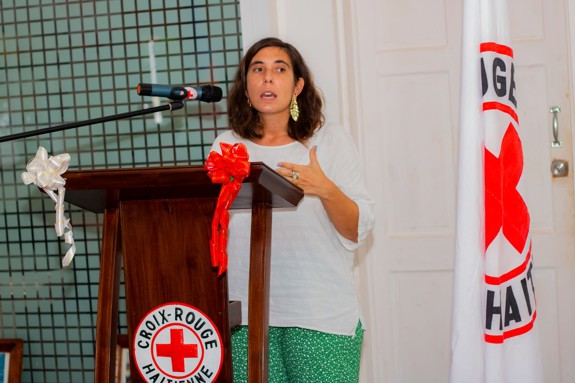"Here in Haiti I started to realize what resilience is"
Julia Velez Ardaiz works as program manager delegate for the Netherlands Red Cross in Haiti. She has been working in this beautiful and complex country for almost four years now. But the Red Cross has been part of her life for more than a decade.

Before Julia moved to Haiti, she started as a volunteer with the Spanish Red Cross. She taught Spanish to migrants, coordinated radio contact for first responders on the beach and worked as a project manager. In 2019, she went to Burkina Faso for the Red Cross, followed by a project in Ecuador. In 2021, she joined the Netherlands Red Cross in Haiti.
Although the countries where Julia has worked are very different and the National Societies also have their own characteristics, she does see similarities: "In the work I do, I see that we have a lot in common. Especially in the field of resilient communities, it doesn't really matter where you are as the community approach would be the same: the most crucial part is to listen to people’s needs and support them in finding suitable solutions, adapted to their context. The same goes for the relationship with the various National Societies: despite the cultural differences, our basic principles are the same - it’s volunteer based, everybody supports the national teams and each person brings its own qualities."
”I want to be judged on my professional qualities”
“I have learned so much here in Haiti. A lot has happened in this country in the past few years, from an earthquake to social unrest, and in spite of the challenges we have continued working hard to support people in improving their lives. I started to understand what resilience is now. Here in Haiti if you fall twice, you have to get up three times. This is especially the case for women – they face a lot of difficulties in their daily life. The cost of living is rising enormously, and they continue managing their business to be able to provide food for their families, develop all household tasks and send their kids to school. It seems almost impossible to make ends meet, but they survive, and they are always looking for new ways to start up a small economic activity or vegetable garden. They get it done, despite the unequal opportunities they face.”
Julia is currently in charge of the Green Pearl Program, managing two projects: one that started in 2019 in La Vallée de Jacmel, in the South-East department of Haiti and another that started in 2022 in Corail in the Grand’Anse department of Haiti. This program is built around a three-pillar framework: Healthy Ecosystems, Resilient Communities and Economically Empowered People/ Climate Change Adapted Livelihoods. It envisions a holistic approach to development by targeting several sectors of the Sustainable Development Goals. Within this project, Julia's work included forest restoration, mangrove restoration and water management, as well as sustainable forms of livelihood as agriculture and other forms of food production: from beekeeping to pig farming and everything in between.
It is not always easy for young women to hold their own in the world of humanitarian aid. "I want to be judged on my professional qualities, and of course sometimes you have people who don't handle that well, but usually a solution is found and I keep learning to manage it better."
"I am really very proud of the Mothers Club we set up here. We started setting up women’s groups, together with the Haitian Red Cross, during a time when delegates were temporarily evacuated due to the unrest in the country. We trained the women and supported them to start savings groups. When I returned, I could finally visit them and witnessed they were still motivated to meet weekly. And my biggest pride was that they had already saved $1,000 on their own. That was very impressive in such circumstances, and this is a wonderful example that by supporting women’s education and reassuring their self-esteem, strengthening their own capacities enables them to reach their goals. The gender trainings are also very interesting, I was able to teach some PGI (protection, gender and inclusion) basic trainings. The small groups are safe places where women talk freely about how they experience the restrictions imposed on them by societal rules. Sometimes these are very sensitive conversations, but it helps them to share their concerns, being listened to, and brainstorm together on possible solutions".
The project in Haiti will continue until the summer. After that, it will probably be time for Julia to go elsewhere again, maybe even take some rest. "It has been a rewarding but also a very intense period of emotions and accomplishments. It is also important to step back and see everything from a different perspective for a while, but I will find a way to keep engaged with the Red Cross."
Julia Velez Ardaiz
Netherlands Red Cross
